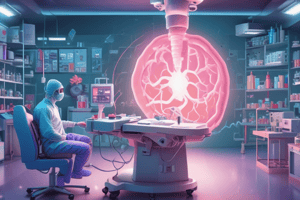Podcast
Questions and Answers
What is the primary role of chemotherapy in cancer treatment for late-stage cancers?
What is the primary role of chemotherapy in cancer treatment for late-stage cancers?
- To replace surgery completely
- To enhance the effects of radiotherapy
- As a primary local treatment (correct)
- To eliminate all cancer cells instantly
What is the primary goal of radical surgery in the treatment of early cancer?
What is the primary goal of radical surgery in the treatment of early cancer?
- To facilitate systemic chemotherapy
- To provide palliative care
- To remove lymph nodes without the tumor
- To ensure complete tumor removal (correct)
Which of the following is a disadvantage of radiotherapy?
Which of the following is a disadvantage of radiotherapy?
- Quick recovery time compared to surgery
- May cause skin burns and enteritis (correct)
- Can cure many types of tumors
- Requires hospitalization for treatment
In late-stage cancer, what is the main focus of treatment?
In late-stage cancer, what is the main focus of treatment?
Which of the following statements regarding lymph node treatment is correct?
Which of the following statements regarding lymph node treatment is correct?
Which treatment option may not be suitable for metastatic cancer cases?
Which treatment option may not be suitable for metastatic cancer cases?
How does hormone therapy work in cancer treatment?
How does hormone therapy work in cancer treatment?
What is a common side effect of chemotherapy due to its impact on rapidly growing cells?
What is a common side effect of chemotherapy due to its impact on rapidly growing cells?
Which of the following is a negative aspect of surgical treatment for cancer?
Which of the following is a negative aspect of surgical treatment for cancer?
When is adjuvant treatment such as chemotherapy primarily indicated?
When is adjuvant treatment such as chemotherapy primarily indicated?
Flashcards are hidden until you start studying
Study Notes
Prophylaxis and Early Treatment
- Eradication of precancerous lesions is crucial, e.g., familial polyposis often requires total proctocolectomy.
- Mastectomy is a common preventive measure in high-risk patients.
Multidisciplinary Approach to Cancer Treatment
- Early cancer (loco-regional) indicates curable and operable conditions, with no evidence of distal spread.
- Radical treatment is essential, employing loco-regional modalities such as surgery and radiotherapy.
- Adjuvant systemic treatment (chemotherapy) is used when distant metastasis is a possibility.
- The number of involved lymph nodes correlates with the risk of microscopic metastasis.
Late-Stage Cancer Management
- Incurable, systemic late-stage cancer requires palliative treatment due to distant metastasis.
- Palliative care focuses on alleviating symptoms through systemic treatments like chemotherapy and hormones.
- Surgery or radiotherapy may be employed for symptom relief, with analgesics utilized for pain management.
Surgical Treatment
- Radical surgery aims to completely remove the primary tumor with a wide safety margin to avoid microscopic extensions.
- Lymph node management varies per cancer type, with removal recommended in gastrointestinal tumors when involved.
- Care must be taken to prevent spillage of malignant cells during surgery.
Advantages and Disadvantages of Surgery
- Surgery provides quick and effective treatment, often ensuring complete excision verified by histopathological examination.
- However, it can result in functional and cosmetic disabilities and is not applicable for advanced tumors.
Radiotherapy
- Can serve as an alternative to surgery or supplement it; particularly effective in lymphoma cases.
- Utilizes powerful types of radiation: teletherapy (external) and brachytherapy (internal placement of radioactive materials).
Advantages and Disadvantages of Radiotherapy
- Benefits include minimal functional impairment and the ability to eliminate microscopic extensions, suitable for patients unfit for surgery.
- Drawbacks include less sensitivity for certain tumors, potential skin burns, and a slower treatment course (5-8 weeks).
Chemotherapy
- Considered when micro metastasis is likely, used as secondary treatment in early stages or primary in late-stage cancers.
- Operates by preventing cancer cell multiplication via DNA replication interference.
Advantages and Disadvantages of Chemotherapy
- Can reach malignant cells systemically, offering cures for various cancers like lymphomas and testicular tumors.
- Associated side effects include damage to healthy cells, leading to conditions like anemia and nausea.
Hormone Therapy
- Involves hormone blocking or supplementation to manage cancer growth rates (e.g., anti-estrogens for breast cancer).
Prognosis Factors for Malignant Neoplasms
- Tumor characteristics, classified by TNM (size, lymph node involvement, metastasis), affect prognosis significantly.
- Larger tumors and involvement of numerous lymph nodes worsen outcomes; well-differentiated tumors provide a better prognosis than undifferentiated ones.
- Other factors include tumor site, type (sarcomas worse than carcinomas), age, chronic conditions, and delays in management.
Management Considerations
- Emphasizes the importance of early detection and timely treatment.
- Poor prognosis is linked to age, chronic illnesses, immunosuppressive treatments, malnutrition, and any delays in healthcare access.
Studying That Suits You
Use AI to generate personalized quizzes and flashcards to suit your learning preferences.





